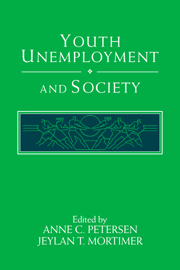Book contents
- Frontmatter
- Contents
- Contributors
- Foreword
- Introduction
- I INVESTMENT IN YOUTH
- 1 Youth, unemployment and marginality: The problem and the solution
- 2 Social capital, human capital, and investment in youth
- 3 When may social capital influence children's school performance?
- Reply to John Modell
- Reply to James S. Coleman
- II MACROSOCIAL PERSPECTIVES
- III INDIVIDUAL PERSPECTIVES
- IV SOCIAL CONSEQUENCES AND INTERVENTIONS
- V IMPLICATIONS FOR RESEARCH
- Index
1 - Youth, unemployment and marginality: The problem and the solution
Published online by Cambridge University Press: 05 May 2010
- Frontmatter
- Contents
- Contributors
- Foreword
- Introduction
- I INVESTMENT IN YOUTH
- 1 Youth, unemployment and marginality: The problem and the solution
- 2 Social capital, human capital, and investment in youth
- 3 When may social capital influence children's school performance?
- Reply to John Modell
- Reply to James S. Coleman
- II MACROSOCIAL PERSPECTIVES
- III INDIVIDUAL PERSPECTIVES
- IV SOCIAL CONSEQUENCES AND INTERVENTIONS
- V IMPLICATIONS FOR RESEARCH
- Index
Summary
All societies invest in the socialization of their young to roles valued for adults. Whereas traditionally the locus of this socialization was the family, with industrialization, adult work roles increasingly moved outside of family control. Many societies began compulsory education for all young people, and extended it to older ages. These social changes subsequently postponed the age at which young people began to work and extended the responsibility for socialization of youth from families to schools. Extended schooling with same-age peers especially influenced the nature of adolescence, the transition period between childhood and adulthood.
These social changes have made responsibility for socialization of youth more diffuse, thereby increasing the likelihood that young people are not well integrated into society (e.g., Rutter, 1980). Indeed, several scholars (e.g., Lewin, 1939; Muuss, 1975) consider the period of adolescence to be an inherently marginal one, a time when individuals may possess the requisite competence for adult work and family roles but are denied access to these roles. Such adolescent problems as alienation, delinquency, and substance use are frequently attributed to the lack of a challenging social role (e.g., Conger & Petersen, 1984; Erikson, 1968). This is not meant to imply that adolescents are without roles. By definition adolescents occupy social roles in several contexts (e.g., family, school, peer group). The premise is that adolescents are alienated or marginalized in such a way that they cannot assume active, meaningful, and productive roles in adult society (Nightingale & Wolverton, 1988).
- Type
- Chapter
- Information
- Youth Unemployment and Society , pp. 3 - 33Publisher: Cambridge University PressPrint publication year: 1994
- 4
- Cited by



